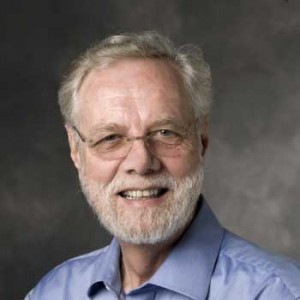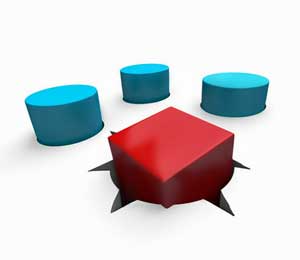Now this is exciting.
The Open Medicine Foundation (OMF) has announced it has created and is raising funds for a huge “End ME/CFS” project. They’re looking for five million dollars a year to fund it — about double the NIH’s current annual spending on all ME/CFS research. That’s a really ambitious project. Could they actually pull it off?
“What is needed is a total attack on the problem.” – Ron Davis PhD
I think they could, and the reason why starts with Ron Davis PhD, the originator and leader of the project. Davis has been thinking about producing a high-level consortium to attack Chronic Fatigue Syndrome (ME/CFS) for years. The idea of a consortium immediately came up when I first talked to him about three years ago. His son, Whitney, had introduced us. Whitney was quite ill then, but since then has gotten much worse. He now has one of the worst cases of ME/CFS I’ve heard of.
In order to understand where this project is coming from and why it might work let’s take a look at the man behind it.
Dr. Ron Davis
“He’s a frequent provider of disruptive core technologies.”
Ron Davis PhD has directed the Stanford Genome Technology Center for twenty years. He has a long list of firsts by his name including one – using restriction fragment polymorphisms to construct genetic linkage maps – that helped launch the field of genomics in 1980 and ultimately made the Human Genome project possible.
He’s won numerous awards and prizes (Eli Lilly, Distinguished CIT Alumni and NAS Awards and Dickson , Gruber and Warren Alpert Foundation Prizes). He won the Lifetime Achievement Award from the Genetics Society of America ten years ago. PubMed lists over 500 publications for Dr. Davis – the most I’ve seen for a researcher.

One researcher wrote that Davis’s contributions to the field of genetics are so seminal that it’s impossible to quantify their impact
At the presentation of the Warren Alpert Prize last year Harvard Medical School geneticist Clifford Tabin concluded that Davis’s contributions were so seminal in the world of genetics and disease that it was “impossible to quantify the impact” he and his colleagues had had.
One nominator for Davis’s Gruber Prize stated Davis has “provided the indispensable infrastructure that has driven the astonishing pace of genetic discoveries, as well as provided key technical, intellectual and conceptual contributions to a breathtaking range of genetic problems.”
In 2013 Davis was pegged in an Atlantic Monthly article as one of eight inventors tomorrow’s historians will consider the greatest inventors today. “He’s not just a one-hit wonder,” said Church. “He’s a frequent provider of disruptive core technologies.”
Frequent is the word. Three years ago Dr. Davis talked about the urgent need to assess the role the HLA region of our genome plays in ME/CFS. No one, however, had been able to figure out how to analyze this very complex region of our genome. In the interview below he reports his lab has developed a low cost means of doing that.
It’s safe to say that nobody with this kind of background and reputation has worked in the ME/CFS field before.
The Biggest Challenge
“I really enjoy working on problems that others think are unsolvable.” – Ron Davis
Now Davis is engaged in the biggest challenge of his career: solving Chronic Fatigue Syndrome. He’s best known for his ability to devise creative solutions that clear up technological impasses. He likes nothing better than to attack complex problems.

With it’s diverse population, it’s many unanswered questions and it’s lack of funding beating ME/CFS is the biggest challenge of Davis’s career.
He’s got one now and not just at a technological level. The other stuff was easy compared to solving the mystery of a disorder that isn’t well-defined, is mostly ignored by the powers that be, and that has had a spotty record of research.
Davis believes both the field and medicine itself are ripe for breakthroughs. He’s been making the rounds telling everybody that ME/CFS is the field to be in now. This is the place to make big breakthroughs that resonate throughout the medical field. He is convinced that cracking ME/CFS will not just solve ME/CFS, but will provide key insights to the other puzzling neuro-immune disorders that dot the medical field.
Heavyweight Group
The idea is to get experts from inside the field and from outside the field. The ME/CFS experts will lend their deep knowledge of this field. The experts from outside the field will bring a rigor and creative approach to problem solving that has made them experts in much larger fields than ME/CFS.
Thus far Davis been able to gather a group of partners the likes of which we haven’t seen before in ME/CFS. The Scientific Advisory Board includes (and the list will grow over time to include ME/CFS experts and more outside researchers):
- Mark Davis PhD – (170+ publications) runs own immune lab (The Mark M. Davis Lab) at Stanford. One of the things he’s doing is characterizing what a normal immune system actually looks like.
- Mario Capecchio PhD – (200 + publications) molecular geneticist and Nobel Laureate and Lasker prize winnder
- Craig Heller PhD (150 + publications) – Stanford exercise physiologist and the inventor of “the glove”, a device that reduces body temperature in order to increase muscle performance.
- Baldomero M. Olivera PhD (300+ publications) – a University of Utah neuroscientist focusing on how the ion channels and receptors affect nervous system signaling.
- Ron Tompkins MD, ScD – the leader of the sepsis consortium Dr. Davis participated in, Dr. Tompkins (350+ publications) has produced ground-breaking work on the process of inflammation.
- Andreas Kogelnik MD, PhD – ME/CFS expert and founder of the Open Medicine Institute.
- James Watson PhD – the Nobel Prize laureate who, with Francis Crick, uncovered the structure of DNA.
How many boards boast two Nobel Laureates? No one has ever brought this much brainpower together to study ME/CFS before.
An Emphasis on Rigor
“We wanted the right answer no matter whose theories we destroyed.” – Ron Davis on the Trauma Consortium
Ron Davis is a stickler on scientific rigor. Time and again in our discussions over the years he’s emphasized the need not to be beholden to any preconceived notion – to be open to where the science leads you.
In this process you put everything you know or think you know about ME/CFS at risk. You’re ruthless in your quest for the truth. Instead of trying to prove something is right, your first goal is to find the chinks in a finding’s armor. It’s like looking at a diamond. You hold it up and look at it from every angle to find any flaws. Then you attack the flaws. Anything that makes it through the fire of this kind of rigorous inquiry is rock-solid. You can bank on it.
Then you figure out your priorities. If it requires creating new technology (and it will) you do that. You gather a large number of representative patients and focus on them throughout. Then you find the best experimentalists in the field and you have them do the lab work. You gather another large cohort of patients and validate the findings.
At every step you use the best technologies, the best materials, the best study designs, and the best researchers.
This kind of research is the antidote to the recent AHRQ report which eliminated 90% of the studies it gathered up for consideration because of methodological and other problems. It’s about producing findings that stick. It’s about producing seminal insights the field can build on for years.
Expect Surprises
“We discovered that the main theory of trauma taught in medical schools was totally wrong.”
Don’t be surprised if their efforts don’t overturn some ideas regarding ME/CFS. In fact, be surprised if this effort doesn’t yield completely novel ideas about ME/CFS.
It wasn’t as if trauma was an unknown entity when the Tompkins group took it on. It had been studied extensively – just not in the comprehensive manner his group used to look at it. It turned out that lots of the ideas regarding trauma and sepsis were wrong.
By the time this consortium has completed its mission, you can expect a new field to emerge. Expect ME/CFS to be completely redefined. Expect several subsets or perhaps disorders inside of it pop out. Expect them to illuminate numerous pathways that lead to the production of “ME/CFS”.
Mega ME-CFS Project
“I really enjoy working on problems that others think are unsolvable, and I’ve been finding, to my surprise, that the older I get, the easier it is to take on those problems.” – Ron Davis
This is research on a different level than we’re used to. It’s a $5 million a year project. That sounds like a lot of money. For ME/CFS it is a lot of money – about double the federal funding for this disorder – but it’s not a lot of money for the NIH. It’s not a lot of money for medical research, and it’s definitely not a lot of money for an often disabling disorder that affects a million people or more in the United States and many millions more across the world.
Still for anyone else, given where ME/CFS is, it might seem like a pipe dream. But this is the man who created the technology that made the Genome Project possible. This is the man named as the most likely person in the medical field to be designated one of the greatest inventors of his time. This is a man whose son has one of the most severe cases of ME/CFS you’ll ever find. If anyone can solve the multitude of puzzles that constitute this disorder, he can.
He’s going to need help. Davis is not a rah-rah kind of guy. He’s an inventor, not a publicist. Give him the tools and I’m confident he can engage the collaborators and invent the technologies we need to crack this disorder, but he needs our support.
This is a long-term effort. Don’t expect answers overnight. New technologies will need to be developed. But give this Consortium the funding and time it needs and it’s hard to imagine it won’t succeed.
To support the project go to www.openmedicinefoundation.org/ways-of-giving/donate or contact us at donate@openmedicinefoundation.org.
Dr. Davis Talks
“The millions of suffering ME/CFS patients are owed an apology and a concerted urgent effort to find effective treatment” Ron Davis
About six months ago I asked Dr. Davis to answer a few questions:
You’ve been engaged in high-level research at Stanford for many years. Now you’re working on ME/CFS. What is different about working on ME/CFS field as opposed to other fields? Another way to ask this is, “What is missing in ME/CFS which is present in other fields that is keeping the ME/CFS field from progressing the way other fields do?”
What is missing in ME/CFS research is long-term stable funding. Short-term funding is okay for specific small projects, but what is needed is a total attack on the problem. This includes developing new technology, which may take time.
For example: a number of laboratories have measured gene expression from cells in the blood. However, blood is a complex mixture of many types of cells. It is obvious that gene expression from every cell type in the blood measured independently would be much better. It could give us more information and may yield a molecular diagnostic test.

In the last couple of years Davis created not just the first way to study the HLA part of our genome, but he created a cost effective way to do that as well.
Unfortunately, there is no technology available to reliably accomplish this for every cell type. This technology needs to be developed. It is important to note that this does not have to be solely funded by ME/CFS research dollars because the technology is generic and is useful for many diseases.
For example, we are currently sequencing the HLA region in the human genome. This region controls many aspects of the immune system. It’s a very complex locus and is not revealed by “whole” genome sequencing. We have developed a very accurate technology that can sequence this region at very low cost. This technology was developed using funds from the Navy and NIAID. Now it can be used in ME/CFS research at very low cost.
Another serious problem is there is no molecular diagnostic test for ME/CFS. This can result in grouping similar diseases into one group. Such a heterogeneous grouping will make it difficult to get unique quantitative molecular information and understanding of what is wrong. This problem is confounded by each set of investigators collecting a new set of patients for every study. It would be far better to have one large set of patients that is used for every study. Validation would then be done on a second or third large set of patients.
The problem is further complicated by having a loose and non-specific definition of the disease. Including patients that have some of the symptoms but not the disease can result in considerable confusion about treatment. If treatment helps those patients with some of the symptoms but not the disease and does not help those with the disease, this could result in a mistaken mandate that all patients be treated in this manner, which could actually harm those with the disease.
You’ve worked in Consortiums before and would like to put one together for ME/CFS. What can consortiums accomplish that individual researchers or even research groups cannot and what kind of consortium do you envision for ME/CFS?

A ruthless commitment to truth exemplified the Trauma consortium’s work. It overturned several established theories on trauma and inflammation
For 10 years I worked on a large consortium (Inflammation and the Host (human) Response to Injury) funded by the NIH (NIGMS) and involved 16 laboratories (most of the laboratories that worked on trauma) in the US. It was chaired by Ron Tompkins, MD, at MGH. He did a marvelous job and I think this should be the model for other consortiums. I was the head of genomics for the project. We all met at the O’Hare Airport (Hilton) every 3 months to go over new data and plan the next experiments.
There were several principles that we used.
- We wanted the right answer no matter whose theories we destroyed. Some of our results have upset a number of researchers. But we have a massive amount of data supporting our conclusions.
- We wanted the best experimentalists to do the experiments. When we did not have the best we recruited the best. Not everyone in the consortium had to do experiments. In fact very few of the members did experiments. Everyone had to come to the meetings and share their knowledge and expertise and give suggestions.
- All these contributors were on all the publications. This last point is very important. At the beginning many researchers wanted to collect their own patients and collect their data in their own laboratory. This would have been a disaster. The experimental variance by this method would have been so great that it would have obscured most of our results. In the end only a few researchers collected data (~10% of the group). It is one of the largest and best molecular data sets ever collected on humans. Aside from the hundreds of thousands of facts about individual genes, we discovered that the main theory of trauma taught in medical schools was totally wrong. We also found that the mouse model for trauma used in research laboratories throughout the world showed no relationship to human trauma and should not be used to model human trauma.
I think something like this consortium should be used for ME/CFS. It should include physicians that treat ME/CFS patients. It should also include the best experimentalists and thinkers from several scientific disciplines regardless of any experience with ME/CFS.

The ME/CFS community is owed a concerted effort to understand this disorder and find treatments for it
This group should work together to design a total attack on ME/CFS and focus on understanding the disease, finding diagnostic markers, and devising treatments.
Medicine and science have neglected and misunderstoodME/CFS for so long that they really need to make up for their mistake by inspiring and supporting the most high-powered scientists available and funding a large group of experts in different fields to generate the best data and analysis possible.
The millions of suffering ME/CFS patients are owed an apology and a concerted urgent effort to find effective treatment.
To support the project, go to www.openmedicinefoundation.org/ways-of-giving/donate or contact us at donate@openmedicinefoundation.org.











Whoa! Finally, a project to fill the hole left when Jonathan Kerr stopped his research. I hope and expect that NIH will learn from this.
It’ll be very interesting to see the NIH handles the grant requests coming in from this group.
It is TRAGIC that those affected worst have so little voice in the rules, policies and decisions because they are incapacitated, living on small fixed incomes while costs, including MEDICAL CARE COSTS are increasing – at an alarming rate for those on multiple medications and Medicare (thanks to the “Doughnut Hole”) – costs continue to rise, subsidized and low income health care plans continue to be cut as insurance providers claim “big losses” in those plans most affordable and cut services and increase co-pays. The inequity in the system continues to proliferate at an alarming rate with no end in sight.
This is incredible news. We can’t ask for more intelligent and better credentialed scientists than these. Let’s get these people funded.
With a million CFS patients in the US alone, $5 a year from each, or $10 a year from even just half, would get the job done. Certainly that is not beyond the reach of most people. With heavy hitters like Dr. Davis leading the charge, however, there is absolutely no reason we can’t get big donors who could fund a bulk of the project at a blink of an eye. Let’s do this!
Crowd sourcing can be incredibly powerful. I know – this website is mostly supported by people giving very small contributions regularly…
Dear Cort Johnson,
why can’t we ask help to Mr.Gates or to Mr.Zuckenberg ?
I think that they will help millions of illness persons .
Many thanks for your great work Mr.Johnson
How do we get behind this and get donations going?
My heart goes out to Whitney Davis and his family.
This is such incredible, great news. Thank you so much for sharing it with us, Cort.
This is great news!
This sounds fantastic! It will take time. I see the trauma project took 10 years. Perhaps it won’t show any treatment results in reasonable time for me, or perhaps there will be treatment to make my old age easier. Here’s hoping.
As a woman, I am disappointed that all the named researchers seem to be men. Where are all the women who could or should be contributing to projects like this? Are the women in the wrong areas or do they not have the right level of expertise?
Do you think Stanford could possibly come up with any of their $960,000,000.00 annual financial allotment to dedicated research? Yeah that’s 960 Million!
Probably not for ME/CFS even for Davis.
I’d rather it not go through Kogelnik though.
Greg
Well put Greg…Very well put 🙂 🙂 🙂
We shall see, huh? You know it can’t have been or be easy even for Davis there but we’re building a nice core of Stanford researchers looking at ME/CFS now… Look at this – there’s Davis, there’s the Zinn’s, there’s Jared Younger and of course, there’s Montoya…(and there are three more that did studies at the Symposium….), plus we have Davis and Heller on the SAB of this effort….That’s quite a group…
I think Stanford will jump in when they feel they’re about to miss out on something if they don’t. You know it was reportedly murder there for Montoya at the beginning. I’d don’t know much better it is now but it’s got to be better…
They’re one of the best medical schools in the country…..we could sure use them on board full time!
FYI, it’s not “going through Kogelnik”. Linda Tannenbaum is the Executive Director of the Open Medicine Foundation, which is independent from the OMI. Ron and the scientific advisory board are running the consortium. Kogelnik is there as an expert on ME/CFS, and a smart scientist, which he definitely is. These are ALL very good people who are super-motivated to find answers. Lots of the other prominent ME/CFS docs/researchers will be invited to participate in the consortium. It will be BIG. We need to unite and conquer!
Thank you so much Cort, for this wonderful article. It made me cry. I know they can do it, and I’m aching for our son to get better. This needs to work before it’s too late for him. They are ready to go. They just need the funding! I’m hoping everyone sees this as the game changer that it is, focus their donations on this project, and actively fundraise, however they can. I’d post a photo of Whitney if I could figure out how to do that here. So sad and tragic. I pray for this to work fast, for all the people suffering who deserve to get their lives back!
Janet, thank you for your candor. My fervent hope is that this cohort will include the severely ill patients–such as your son. I’ve noticed during the past 15 or 20 years that most “ME/CFS medical experts” have designed studies that made it impossible for the severely ill to participate. Many patients who could work, go to school, drive cars, shop and cook were included. Those in nursing homes and those who received a nursing home level of care at home were excluded. With Dr. Davis’s personal understanding of what “severe” really means, I’m hopeful that this time the sickest patients will be studied.
Hi Sue, I’m currently in a nursing home and looking to find other nursing homeswith ME patients so the managers here can talk to other managers about caring for ME patients. Do you know of any nursing homes with ME patients ?
I’m in Australia.
Hey just in the last couple of days the second Nobel Laureate joined the Scientific Advisory Board. Ron Davis really gets around!
This ability to attract this kind of talent is why this project is a) so unusual and b) is so pregnant with possibility…
Who gets two Nobel Laureates to sit on a Scientific Advisory Board?
Wow…..
Best news I’ve heard in years.
“With a million CFS patients in the US alone, $5 a year from each, or $10 a year from even just half, would get the job done. Certainly that is not beyond the reach of most people.”
I could get behind this,
Could you use GoFundMe or crowd funding,
I realize that Dr. Davis has full understanding of the seriousness of this illness but I’d be happier seeing more ME/CFS medical experts involved. If I see some of the respected names in CFS/ME treatment or research join in or at least express a favorable opinion of the project, I’d be willing to donate some money.
I think you’ll be happy. I’ve talked to people involved at the project and believe me they are coming…The ME/CFS experts are going to be a vital part of this project. They actually have to be because the carefully selected patients that arf going to be the focus of this research are going to have come from them.
I imagine the next announcement will be regarding the ME/CFS experts who are on board.
Cort?
When you write “carefully selected patients” can you tell me more please?
Cort,
This shows me you need to think bigger. No more $5 month to support health rising – up the ane to $5 million a month.
Actually, this is just the type of think which might help CFS get some funding. We need to be more like breast cancer – in you face all of the time.
🙂 We do think too small! I agree…
This is great news that I really need to hear today. I wish large corporations would fund this . We really deserve some answers while we are still alive. This gives me some renewed hope . Dr. Davis I am filled with Gratitude that you are taking on this overwhelming challange. Bless you and all of the researchers involved.
I am so grateful to Ron Davis.
Whitney, your suffering has not been in vain.
Everyone, PLEASE DONATE!
Janet Dafoe, please tell Dr. Davis:
The patient cohort MUST include the sickest patients, those who are bedbound. To test these patients you MUST send medical personnel into their homes to draw blood, etc. We CANNOT travel to medical centers and sit upright all day filling out paperwork, like the mild/moderate patients.
Without home visits, you will get the same old cohort of patients, whose results have yielded ZERO FDA-approved treatments in 30 years.
There is a HUGE difference between the best and worst patients with a “CFS” diagnosis. PLEASE include the worst patients.
YES! I think this would be Important also!
As Dr Da is son is sadly severely affected, I am hopeful they will be including bedbound and/or housebound patients in any studies.
They’ll be getting their patients from ME/CFS experts – and they will certainly include the patients they think epitomize this disorder and will provide the most insights. I imagine the majority of them will be quite ill.
I’m so happy about this!
I’m 62 yrs old & have had ME/CFS for 22 years. I’ve participated in many Research Studies over the years, but I think that this project sounds very promising! Don’t know that it will be in time to help us “olders”, but will be there for 3 of my daughters who suffer from ME/CFS & Fibromyalgia.
My best wishes to Dr. Davis, his team and each of the specialists who are working for a cure!
Oh– I’ve been very fortunate to have a great Dr, but this site is the best! Thanks a million, Cort! I’ve made my monthly contribution and hope everyone pitches in too.
Thanks Carol – the monthly contribution keep Health Rising going. If anyone thinks that $5 or $10 or more a month doesn’t make a huge difference then please think again. We get most of our funding from recurring donors.
Give me another 100 recurring donors and watch things fly on HR. We’ll change what patient support looks like on the internet.
Cort, and everyone else: I spoke to Linda Tanenbaum a couple of days ago, when I found out about OMF (Open Medicine Foundation). The address and contact info are right there on their website. I left a message and she called back shortly after getting my message. She is so excited about this project.
I call the gathering of all these experts and Nobel Laureates a “prestigious assemblage.” They are working towards getting an invitation to the Banbury Center for Scientific Conferences, in Cold Spring Harbor, NY. First, they have to raise the $$ for that. It is the place where plans and their efforts will really take off.
Please, everyone, join iGive.com and register on the site so you can choose all the stores you shop at online. These websites will automatically donate money (percentage of your order) to Open Medicine Foundation (you have to choose your favorite charity). BTW, OMF is a registered non-profit organization. Some stores are Amazon, Best Buy, Petsmart, Avon, Bath and Body Works and a very long list. Even travel sites and hotels are well represented. Please spread the word on Twitter, FB, Instagram, Tumblr, etc.
Thanks Cort, for posting this wonderful blog for us.
Wow, this is very hopeful. Thanks for sharing this, Cort.
On another note, I like to pin helpful posts like these on pinterest to remember them and share with others. Is that ability disabled for this site? The past couple of times I’ve tried for different articles, it says “We’re having some trouble talking to hrzone.healthrising.netdna-cdn.com.”
No kidding- Thanks for letting me know. Pinterest is important. Are you using the button on the left (which is sometimes obscured) or doing it from Pinterest?
Ah ha, I didn’t see your pin it button. It did work using that and I got it pinned, but doesn’t work when I tried again to use the pin it bookmarklet.
Well – at least it worked once…May be it only works once per blog – I don’t know. These things are beyond me. 🙂
So far this doesn’t look like an international effort. If Professor Julia Newton, from Newcastle, was included you’d add both an international perspective, a woman and someone doing ground-breaking work on fatigue. At the same time their ME clinic looks hard for treatable problems in those referred so that they don’t include in their studies on ME many people who should not be there.
Her background is work on aging, an example of a researcher from outside the field moving in.
Thanks for adding her name. They need an expert in autonomic nervous system on there IMHO.
Wow! I believe we have a winner in this approach. We definitely need to get behind this doctor and project. I don’t have much but I can afford $20 a year and I’m not from the States. I don’t think it should take as long as some might think anyway. Puting this many experts together on one mission like this, no matter how complicated, should create results fairly quickly. Especially when the leader is so motivated. I will definitely be putting this info. on my Facebook support page and asking one of my sponsors to help as well. Here’s to Dr. Davis… Way to go!!! Rah rah kind of guy or not.
Please don’t ignore what Carol Carlson said. Though I’m not familiar with IGive it sounds like the way to go since there are so many companies involved and we all do business with at least one or two of them. Amazon anyone? 🙂 A lot of money could be raised through IGive.com.
GoFundMe is also a great way to raise money. I’ve never used it before except to donate money through it. And I don’t know if it’s cool for us to simply go ahead and set up something like GoFundMe for this project without their approval? Or if the research project would have to be the ones to set it up? I guess that might be answered by reading about how to use it. I can certainly at least figure out how to set up GoFundMe. I’ll do it if Cort says the word.
I’ve come here many times to read about studies only to feel frustrated in the end because I feel like nothing definitive ever comes out of the research and it only raises more questions than answers for how to cure this horrible illness.
For once I don’t feel frustration. I feel hope even though I also feel like I’m at least 70 years old (I’m 57 and had CFS/FM since I was 40). I do wonder if I’ll ever see the fruits from this project in my lifetime. Either way it gives me hope.
Thank you, Cort and all who donate to this site to keep it functioning.
Thanks Marie…
If the consortium gets fully funded I’m positive you will see the fruits of it. I’m 55 (don’t know how that happened but it’s true) and I’m sure I will. It just needs to get funded. …
Marie,
Your comment that you feel “at least 70 years old” is so true. My mother was in her mid 80’s when she started to experience a few of the functional limitations I’ve had since my early 30’s. Even just before her death last year at almost 92, she was able to work around her home and garden without experiencing the type of post-exertional malaise ME patients do.
Karen
Cort, I saw that someone asked above about doing individual fundraising events, is there a site that is being used for fundraising, like the OMF donations page, or is there another way to donate? Linda Tannenbaum is an amazing person to work with, I have had a family member and a friend of my son, both do fundraisers for OMF. Linda was there to help with whatever they needed. I do believe that when you use a site like Gofundme, they take out a percentage of the donations that are raised. If the funds are to go to the OMF, it would probably be better to talk to Linda and have her help set something up for your fundraisers. OMF has worked so hard to set up their donations page, it is very user friendly. Just a thought.
This is so very exciting, congratulations and thank you to all involved. Thank you Cort for all you do, you cut through the clutter so I can understand so much more.
There are a lot of good patient crowd sourcing initiatives for funding happening but the fundraising is slow. Is the hope this very promising initiative will try to get funds in terms of grants where the big money is?
I think they’re looking for both. Grants will, I’m sure, be a very important avenue of funding for them but they have to get off the ground first – establish the group, analyse the data – determine what research areas they want to explore first – gather pilot data for the grant application and then apply for the grant.
I imagine it will take some time for the grant funding to show up…I’m hoping somebody with a lot of money that’s been looking for a place to put decides that this is it…
Very encouraging post, although I am one of the long-term ill “Oldies” who may not live to see the results of this initiative. Nevertheless, we have just sent $100 to support this initiative. I challenge all other Canadians who follow this blog to donate whatever amount is comfortable for you.
Thanks, Cort, for keeping us so well informed.
Karen
Thanks Karen – nice donation! 🙂
This really looks like a terrific initiative. I love that quote – “What is needed is a total attack on the problem”. We need that on t-shirts at Washington (seriously).
@Janet Dafoe – I’m sorry to hear that your son is so very ill now. Please pass on my thanks to Dr Davis for everything he’s doing for us. I’m sure that thousands of patients share my gratitude.
We may be some years away from a complete understanding of this disease but science can progress by increments as well as by breakthroughs and I can easily imagine parts of the puzzle being solved and leading to useful treatments along the way to the big prize.
Let’s hang in there and let’s start donating – I just did! 🙂
🙂
I think this is where Cheney can REALLY help make an impact and use his uncanny understanding of this illness to great use. His treatment and patient-protocols have historically been shady at best, however he could really help guide this committee in the right direction with his decades of experience.
Would love to see KDM and Shoemaker there as well. And Chia for enteroviral focused research.
Is there a way to register with this project in order to personally fundraise through my family, friends, and colleagues via email donations?
Here is a link to the End ME/CFS donation page. Donations can be made in honor of individuals. Spread the word and the link!
My husband and I are both physicians. Our daughter has CFS/ME. Not only do we need confirmatory diagnostic testing for this illness and effective treatment…we need a full blown effort to educate physicians and families about the reality of it. No longer can this illness be passed off as depression, laziness, or manipulative behavior. Patients harbor guilt, self-doubt, and frustration as a result of medicine’s failure to take it seriously.
We need bill gates or similar to get involved or a fundraising campain that shows children’s life’s being destroyed by this illness. Things happening to children seem to have greater effect and it would be hard for someone to say that a child who does not want to play is malingering or making it up.
Indeed!
Aloha,
Go long, it’s true, I just wish it weren’t. There is no magic dime store remedy here. We must collectively work together.
I’ll be following this story and doing my best to make whatever contributions I can. Just do our best and no more will be enough. The math is simple split globally among patients, making it happen is not. Nothing worthwhile comes easy, let’s roll up our sleeves here and get to work supporting this effort. We are not going to get a better opportunity is this is a good as it sounds. I cannot think of a more promising project ever, for ME.
This very positive and uplifting story gives me hope and really validates, “this and/or these” disease(s).
Best intentions to all who suffer. And as usual – massive mahalos to Cort and contributors to this site :)))
Omg!
I am so thrilled to have read this. Gives me severely needed hope.I am 55 and have suffer with CFS/Fibromyalgia since after birthing my son 6 weeks premature and became stricken in 1983. 30 plus years is long enough! Too long in fact. Plus my daughter suffers symptoms.
Oh dear Lord let it happen while I am still alive so I can direct my daughter to help.
Kaiser is a joke. I am so tired of condescending doctors and health care professionals acting like this illness is not real.
I was a straight A student and high performance athlete before this devastating illness stole my life. I am now mostly house and bedbound.
No one lies about or makes up an illness like this!
I have almost no social life now.
I want my life back!
A high performance athlete before ME/CFS – what a fall that is. I was very athletic as well…Sorry to hear about your daughter.
I am encouraged that we’re getting some really high level players engaged – people who have contacts – people that people in high places listen to – that’s very encouraging for the future.
Cort, I saw that someone asked above about doing individual fundraising events, is there a site that is being used for fundraising, like the OMF donations page, or is there another way to donate? Linda Tannenbaum is an amazing person to work with, I have had a family member and a friend of my son, both do fundraisers for OMF. Linda was there to help with whatever they needed. I do believe that when you use a site like Gofundme, they take out a percentage of the donations that are raised. If the funds are to go to the OMF, it would probably be better to talk to Linda and have her help set something up for your fundraisers. OMF has worked so hard to set up their donations page, it is very user friendly. Just a thought.
This is so very exciting, congratulations and thank you to all involved. Thank you Cort for all you do, you cut through the clutter so I can understand so much more.
Cort, I saw that someone asked above about doing individual fundraising events, is there a site that is being used for fundraising, like the OMF donations page, or is there another way to donate? Linda Tannenbaum is an amazing person to work with, I have had a family member and a friend of my son, both do fundraisers for OMF. Linda was there to help with whatever they needed. I do believe that when you use a site like Gofundme, they take out a percentage of the donations that are raised. If the funds are to go to the OMF, it would probably be better to talk to Linda and have her help set something up for your fundraisers. OMF has worked so hard to set up their donations page, it is very user friendly. Just a thought.
This is so very exciting, congratulations and thank you to all involved. Thank you Cort for all you do, you cut through the clutter so I can understand so much more.
Cort, I saw that someone asked above about doing individual fundraising events, is there a site that is being used for fundraising, like the OMF donations page, or is there another way to donate? Linda Tannenbaum is an amazing person to work with, I have had a family member and a friend of my son, both do fundraisers for OMF. Linda was there to help with whatever they needed. I do believe that when you use a site like Gofundme, they take out a percentage of the donations that are raised. If the funds are to go to the OMF, it would probably be better to talk to Linda and have her help set something up for your fundraisers. OMF has worked so hard to set up their donations page, it is very user friendly. Just a thought.This is so very exciting, congratulations and thank you to all involved. Thank you Cort for all you do, you cut through the clutter so I can understand so much more.
Thanks for all you do Cort, this is my main “go to” for legitimate information and I really appreciate your work. It’s about time there was a serious study of these illnesses. I’ve been sick since 1986 and the level of information and care has been appalling. There are Doctors that really want to help you, but haven’t a clue what to do! It’s been a long road, lots of trial and error. I can truthfully say I’m no better off than when it started, just have a lot of ways to cope with the various symptoms. Hopefully these people will get the funding they need to make a real difference in the lives of some very sick patients, and help the medical professionals to help us.
I think this is the greatest news that we could have ever recieved for us all that live with ME CFS.I To have been bedridden and bound to my home since contracting Epstein Barr Virus at 48yr old on Oct 1,2008.I am now 55 and have not ever recovered. I am Type A Personalty ,have been self employed. and built successful Auto Collision Business and 24 hr Towing. Was working 14 to 16 hr a day 6 to 7 day week before becoming bedridden Oct 1,2008.After contracting Epstein Barr i lost my company.Basically lost everything. You actually loose life as you known it.I could not even walk to the bathroom without a walker and assistance. My life has never been the same. Some say everything happens for a reason,but i just don’t understand why. I will pray that God will anoint these great Researcher s and scientists and epidemiologist and genitisis neurologists and inventors and Doctors involved in this mega research into CFS in hopes of finding a cure. Thank you to all those that are going to be involved
What a fall! But then again many, many people have experienced similar ones.
Hang in there David! We’re all in this together…
I think it’s true about studying ME/CFS and learning about other diseases. For instance in MS studies have reported that elevated C4a levels directly correlate with disease activity while other studies have reported that C4a becomes elevated in ME/CFS patients following exercise challenge. It would be nice to see what C4a correlated with in ME/CFS, and Dr. Davis is absolutely correct that what is desperately needed is to comprehensively study one big group of patients instead of doing small piecemeal studies on new group after new group after new group of small cohorts of patients.
Elevated plasma C4a levels in multiple sclerosis correlate with disease activity-
http://www.ncbi.nlm.nih.gov/pubmed/20409594
Complement activation in a model of chronic fatigue syndrome-
http://www.ncbi.nlm.nih.gov/pubmed/12897748
thank you all so much for your efforts and most of all the hope your work inspires. i’ve been bedridden for 4 years due to me/cfs and struggled daily for several years prior to that. i’m sending positive thoughts your way and so wish there was more i could do. thank you again